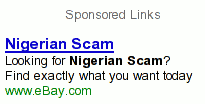In the past two weeks, a new variant of the advance fee scam has dropped into our spam traps: supposed UK-based artists needing help selling their works overseas.
The classic Nigerian scam involves someone claiming to be the relative of a deceased or deposed dictator, general, etc. is trying to smuggle money out of the country and needs to borrow your bank account to do it.
It’s usually a third-world country, often one with political strife, so that the average westerner won’t be too suspicious of the level of corruption implied. You never see this scam claiming to come from, say, France, or Japan, because the process would set off too many alarm bells. Someone needing to transfer that much money would either do it through normal banking channels or through organized crime—not by firing off an email to some random citizen in a foreign country.
The first-world variation, at least up until now, has been the “International Lottery” scam. In this variation you get a winning notice, but of course you need to pay them before they can send you the money, etc. This one generally claims to be based in Europe, often several countries in one message. The idea of a lottery seems much more plausible in the first world.
Someone has come up with a way to bring the 419 scam into the first world. The two samples I’ve seen so far both involve UK-based artists trying to sell their works in the US. The premise is that their customers want to pay by some method that is “difficult to cash” in the UK, so they want you, a US resident, to accept the travelers’ checks, or money orders, then wire them the amount minus a 10% commission.
Right.
I’m seriously waiting for someone to offer a commission on the Brooklyn Bridge.
The setting has changed—instead of a dictator’s widow who has hidden away ill-gotten gains in “darkest Africa,” it’s a happy Londoner living with his or her “two kids” and “the love of [their] life” and selling art on the international market. All shiny, happy and yuppie (with just a hint of bohemian). But the script is the same: Someone wants to clear huge amounts of money through your bank account.
I was going to post some quotes, but as I started looking at them, the similarities really go through the entire message. Continue reading →
